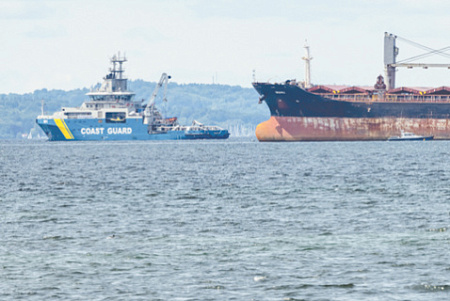
On July 1, Sweden will introduce new rules aimed at strengthening control over foreign vessels passing through the Baltic Sea. This was announced by the government of the country. The measures are aimed at combating the shadow fleet of the Russian Federation, which, according to the West, is used to circumvent sanctions related to oil exports. Against the background of the actions of the EU countries and in response to NATO maneuvers, Russia is conducting naval exercises in the Baltic.
Following Denmark, Sweden adopted a new resolution to strengthen inspections of foreign vessels. But if Denmark has the task of checking insurance documents, technical condition and compliance with environmental standards and maritime safety of ships anchored in the port of Skagen in northern Jutland, then the Coast Guard Service and the Swedish Maritime Administration will receive broader powers.
They will be able to collect insurance information even from ships passing through the territorial waters and the exclusive economic zone of Sweden, and not only from those that enter its ports.
According to the Swedish Ministry of Justice, stricter controls are an important part of countering outdated vessels with an opaque ownership structure and questionable insurance, which are used to circumvent sanctions, primarily the established “ceiling” on prices for Russian crude oil. The Nordic and Baltic countries have repeatedly accused these vessels of creating environmental risks and damaging underwater infrastructure, including energy and telecommunications networks.
One of the latest incidents concerns the Panamanian-flagged Meshka vessel, which was heading to the Russian port of Vysotsk and had about 938 thousand liters of fuel oil in its tanks. The ship ran aground near the Swedish city of Landskrona after it received a warning that it was heading off course and approaching the shore. Swedish authorities have launched an investigation into maritime negligence.
“We are seeing more and more problematic events in the Baltic Sea, and this requires us not only to hope for the best, but also to prepare for the worst,” Swedish Prime Minister Ulf Kristersson commented on the new decree. He said that the information gathered in this way would be useful for preparing new sanctions restrictions on tankers transporting Russian oil.
Recall that as a result of the introduction of the 17th package of sanctions by the European Union, the blacklist of the shadow fleet of Russia has grown to 342 tankers. Although, according to various estimates, the total number of vessels of the Russian shadow fleet allegedly ranges from 700 to 800 units; that is, most of it remains outside EU sanctions.
Since the Baltic Sea is Russia’s main trade gateway, NG asked Professor of international Law Bakhtiyar Tuzmukhamedov how critical the new decree of the Swedish government is for Russian vessels to pass through it.
“If in the territorial sea and the airspace above it (their width should not exceed 12 nautical miles), in accordance with the UN Convention on the Law of the Sea, Sweden, as a party to this Convention, has the rights inherent in sovereignty, with limited exceptions in favor of international maritime navigation and air navigation, then in the exclusive economic zone (this is a strip no more than 200 nautical miles wide) its advantages are limited only by resource rights. “Of course, if the authorities have serious grounds to believe that a vessel exercising freedom of navigation through this zone is polluting the marine or air environment, they have the right to take measures to prevent the consequences,” the expert replied.
According to Tuzmukhamedov, disputes related to activities at sea of concern should be resolved through special legal mechanisms, in particular, the International Tribunal for the Law of the Sea, established by the aforementioned Convention.
“The Baltic Fleet should not be allocated a patrol vessel or a corvette to escort every tanker leaving a Russian port before it enters the North Sea,” the expert believes. “Although who knows, because the fleet needs maritime practice.”
It is clear that you cannot attach a warship to each tanker, and the situation in the Baltic is such that the countries of NATO and the EU currently dominate there, acting in concert. At the same time, the West will not be able to completely close the Baltic Sea to Russia, as this is a violation of all international norms and rules. In addition, Russia still has a powerful navy in the Baltic.
On May 27, the Baltic Fleet launched exercises there, in which, according to the press service of the fleet, 20 ships, about 25 aircraft and helicopters, as well as up to 70 units of military and special equipment are taking part. “A planned exercise of the Baltic Fleet forces is underway with the involvement of part of the forces of the Northern Fleet with the support of aviation of the aerospace forces, the Moscow and Leningrad military districts,” the press service said. It is noted that the crews perform anti-submarine tasks, practice protection against unmanned boats, and also conduct artillery firing at targets on the water and in the air.
By the way, the NATO Baltops-2025 exercises began on June 3 in parallel with the Russian ones. These are traditional maneuvers that have been held in the region for more than half a century. So for Russia, the exercises in the Baltic Sea now serve not only as a response to NATO’s actions, but, apparently, also as a demonstration of its readiness to defend its economic interests in the face of sanctions.
